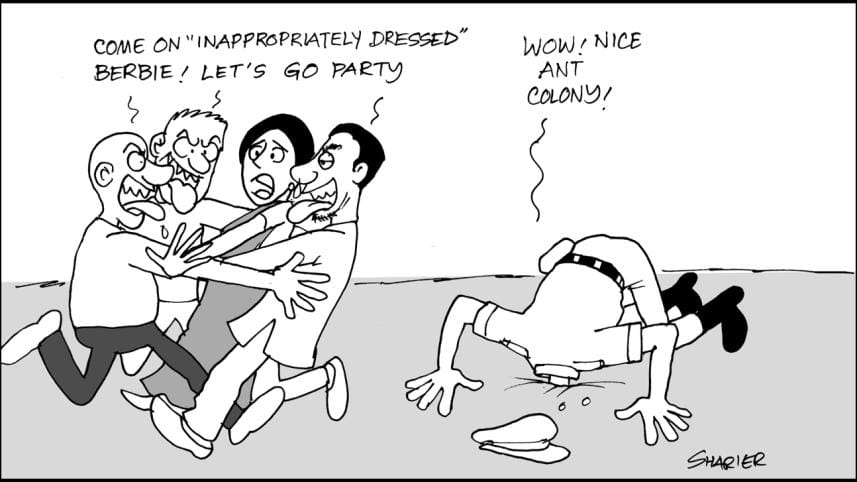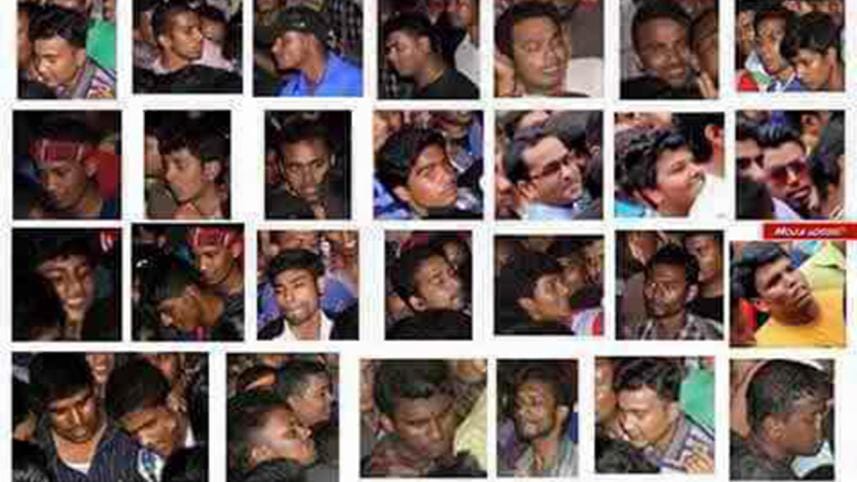Opinion: Eyes wide shut

It took four days for the police to admit that at least 20 women were sexually assaulted by a large group of men during the Pahela Baishakh celebrations at Dhaka University.
A day after the April 14 incident, that triggered waves of public protests, the police unofficially released the surveillance camera footage of the event of the TSC area. While these videos showed that a particular group of young men led by an older bearded man isolated approaching girls from others and launched the heinous sexual assaults—the cops kept on saying that they found nothing.
It was not just the police, but also the Dhaka University authorities who kept repeating to the press that no woman was stripped naked (as if one has to be stripped naked before taking the case seriously)—implying that there was nothing to worry about.
With such an attitude, one could easily see that the incident was being covered up without any action against the culprits—and thereby, ensuring that future molesters would enthusiastically return to any crowd of women across the country.
However, the authorities finally formed two committees yesterday to investigate the situation. The police have also withdrawn Shahbag thana sub inspector Ashraful Alam who is accused of letting go one of the molesters—detained by Chhatra Union leaders who tried to protect the women that day— instead of putting him behind bars.

But this move of the police should have been a procedural action by them on the first day. Under public pressure they are now taking some steps and we are not sure if this is sincere.
This is not the first time that the police have failed to carry out their basic professional responsibility. Back in February when blogger Abhijit Roy was hacked to death by some militants in the same area, Abhijit's wife and other people cried for help. The cops were nearby, but they did not come to save Abhijit or capture the culprits.
In the follow up news on Abhijit's incident, we learnt that the police posted inside Dhaka University premise do not respond to any scuffle between people in the area—because it may be just some 'student vs student' affair; or may be some political activists who are involved there and thereby an interference may trigger political backlash.
If the police maintain such hands-off policy in the campus, it would be natural for the cops not to act professionally when they are needed the most. We believe this is exactly what happened in case of the Pahela Baishakh incident.
There is no room for taking this molestation incident lightly. For many years, religious fanatics have been campaigning against Pahela Baishakh as being "anti-Islamic" and wrongfully citing holy verses to establish that Islam had banned cultural activities like celebrating a new year. While such interpretation is false and irrelevant, many people fall for such arguments.
We have seen that after the Pahela Baishakh assault, some people were blaming the women for "dressing up inappropriately" and thereby putting the blame on them for the incident and justifying their molestations. If one accepts such argument, then one also has to declare a mugger innocent because its your fault to carry a wallet full of money, and a killer is innocent because its your fault to be disliked by the killer.
The April 14 incident may be a work of a group of fanatics or a group of perverts and rapists-in-the-making.
Therefore, the police and the authorities must change their "eyes wide shut state" and ensure that women can be safe and independent everywhere including the streets and festivals.
 For all latest news, follow The Daily Star's Google News channel.
For all latest news, follow The Daily Star's Google News channel.
Comments